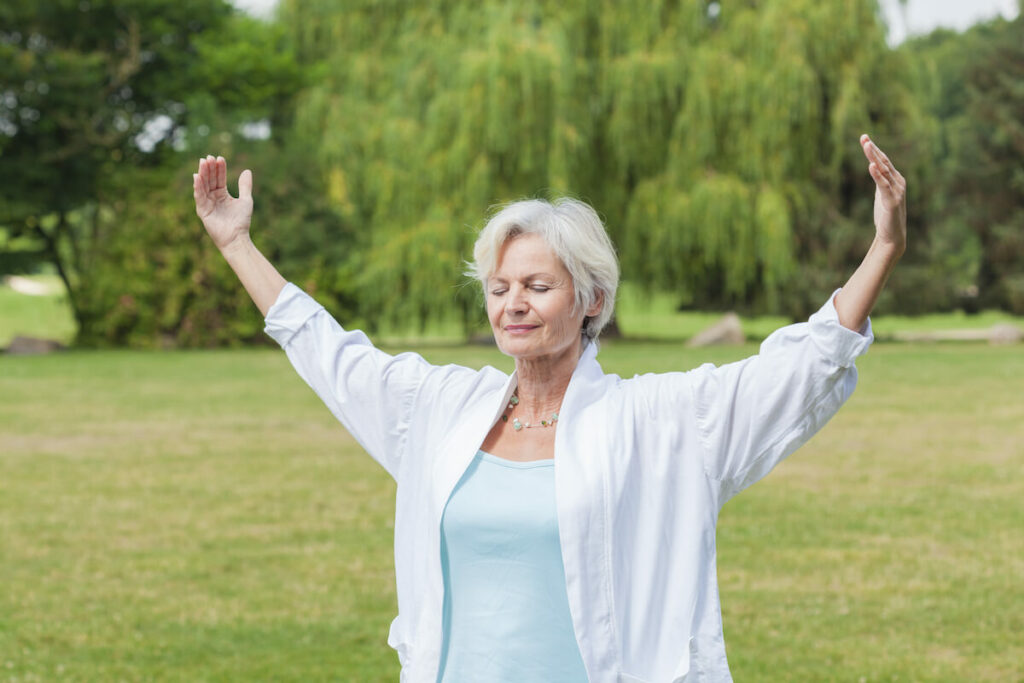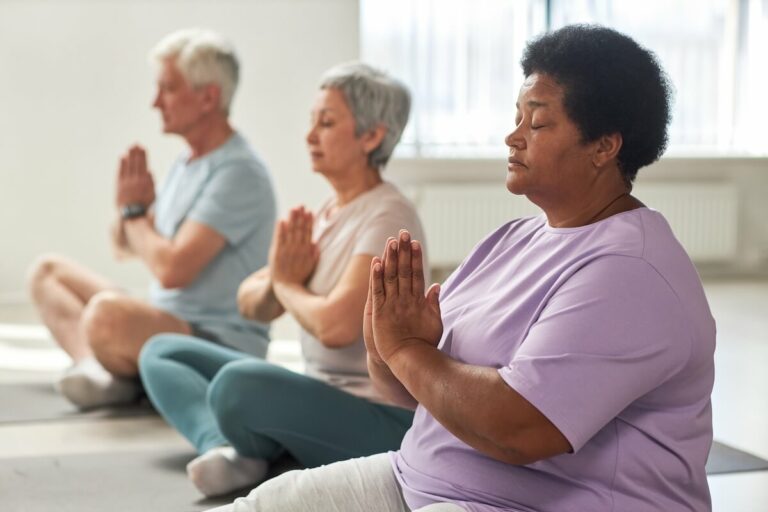Maintaining our physical and mental well-being is important as we go through life. Two practices that have gained recognition for their holistic benefits are yoga and tai chi. These ancient disciplines offer a nurturing approach to health, providing a gentle yet effective way to enhance both the body and mind.
Our team at Bartlett Reserve is comparing the benefits of tai chi vs. yoga, how these practices can improve your well-being, easy tips to get started, and how our senior living community in Durham, NC, can help you implement these practices into your daily routine.

Benefitting Mind, Body, and Spirit
Both tai chi and yoga provide a multitude of health benefits that can significantly enhance a person’s lifestyle. These practices go beyond physical exercise; they nurture the mind, body, and spirit, creating a space where comprehensive well-being can thrive.
Physical Benefits
- Improved Flexibility and Balance: The gentle stretching and mindful movements found in tai chi and yoga help increase flexibility and improve balance, reducing the risk of falls and injuries.
- Enhanced Strength and Mobility: Low-impact exercises strengthen muscles and joints, promoting greater mobility and independence.
- Pain Management: Regular practice can alleviate chronic pain conditions, such as arthritis, by increasing circulation and reducing inflammation.
Mental and Emotional Benefits
- Stress Reduction: Mindfulness and breathing techniques inherent in yoga and tai chi help reduce stress and anxiety, fostering a sense of calm and relaxation.
- Cognitive Function: Engaging in these practices stimulates cognitive function and memory, supporting mental clarity and focus.
- Emotional Well-being: The meditative aspects nurture emotional health, providing a sense of inner peace and emotional resilience.
Social and Spiritual Benefits
- Community and Connection: Group classes offer opportunities for social interaction, building a supportive network, and combating feelings of loneliness and isolation.
- Spiritual Growth: The contemplative nature of yoga and tai chi encourages spiritual exploration and growth, enriching one’s inner life and overall sense of purpose.
Tai Chi vs. Yoga: Which is Right for You?

Both tai chi and yoga employ meditative movement to deepen the mind-body connection. In tai chi, a sequence of continuous, dance-like movements synchronizes with the rhythm of the breath. Many movements are inspired by animals or their characteristics, such as “white crane spreads its wings,” mimicking a crane in flight.
Yoga, on the other hand, involves a series of postures called asanas that also synchronize movement with breath. Each posture has a Sanskrit name, often referencing animals, shapes, or physical moves, such as pigeon pose, triangle pose, and extended hand-to-big-toe pose. Unlike tai chi, yoga requires holding poses for varying periods, which can be more challenging.
Tai chi and yoga both challenge your muscles in unique ways but share a common goal of health and wellness through movement, meditation, and breathwork.
Extensive research indicates that both practices can enhance fitness, mental health, and overall lifestyle. For example, tai chi may be beneficial for fall prevention, helping individuals overcome a fear of falling and boosting confidence in their abilities. If increasing flexibility and range of motion is your primary concern, yoga might be a better starting point. Research shows that these practices can help manage chronic pain and conditions such as:
- Chronic obstructive pulmonary disease (COPD)
- Dementia or other cognitive impairments
- Low back pain
- Osteoarthritis
- Osteoporosis
- Parkinson’s disease
Choosing between tai chi and yoga ultimately hinges on your specific health needs and personal preferences. Before making any changes to your fitness routine, be sure to talk to your physician.
Getting Started: Tips for Beginners in Tai Chi and Yoga
Embarking on a journey with yoga and tai chi can be both exciting and rewarding. Here are some tips to help you get started:
- Seek Professional Guidance: Begin with a qualified instructor who specializes in teaching beginners. They can provide personalized attention and adapt exercises to suit your individual needs and abilities.
- Start Slow: Ease into your practice by starting with simple poses and movements. Gradually increase the duration and intensity as your comfort level grows.
- Listen to Your Body: Pay close attention to how your body feels during and after each session. Avoid pushing yourself too hard, and always honor your body’s limitations.
- Create a Comfortable Space: Set up a serene and clutter-free area at home where you can practice without distractions. A calm setup enhances the overall experience.
- Stay Consistent: Commit to a regular practice schedule, even if it’s just a few minutes each day. Consistency is key to reaping the long-term benefits.
—
By embracing yoga and tai chi, you are investing in a holistic approach to your health that nurtures every aspect of your being. We invite you to contact a member of the Bartlett Reserve team to schedule a tour of our senior living community in Durham, NC. Together, we can explore how these practices can enhance your well-being and bring balance to your life.







